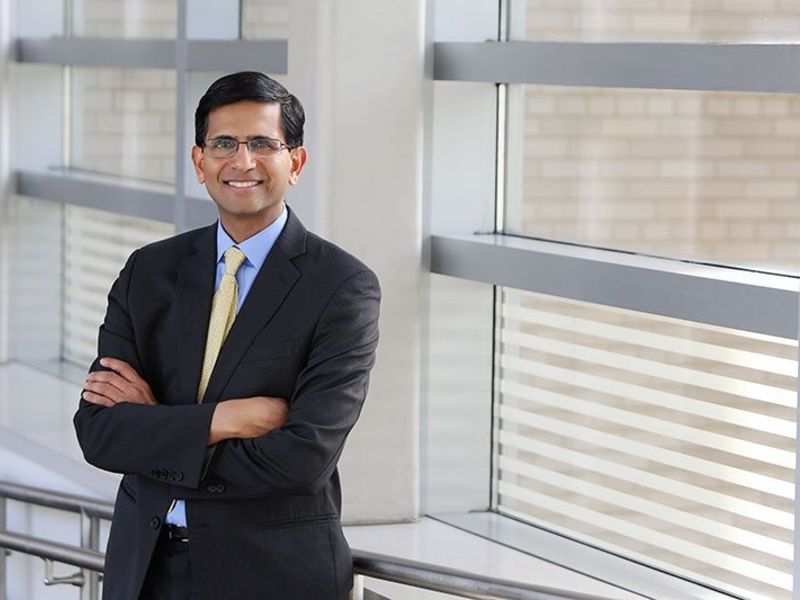Lydia Coutré, Crain's Cleveland Business  Case Western Reserve University/University Hospitals
Case Western Reserve University/University Hospitals
Dr. Sanjay Rajagopalan
With the support of an $18.2 million federal grant, researchers at the Case Western Reserve University School of Medicine and University Hospitals Harrington Heart & Vascular Institute are leading a multi-organizational effort to address cardiovascular health disparities, according to a news release.
The UH and CWRU researchers are also collaborating with colleagues at Wayne State University in Detroit on the initiative, called Addressing Cardiometabolic Health Inequities by Early PreVEntion in the Great LakEs Region (ACHIEVE GreatER). It aims to directly address social determinants of health in Black communities in the Cleveland and Detroit metropolitan areas.
The grant comes from the National Institutes of Health’s P50 program, according to the release.
With a focus on cardiovascular health, the team will study the impact of interventions involving personalized, adaptable approaches to lifestyle and life circumstances led by community health workers, according to the release, which notes that access to cutting-edge technology, care coordination, and lifestyle, diet and medication guidance have traditionally been limited to those with privilege.
“There are seismic gaps that exist in health care for Black Americans that continue to result in disproportionate and disappointingly poor outcomes,” Dr. Sanjay Rajagopalan, CWRU School of Medicine professor and chief academic and scientific officer of the UH Harrington Heart & Vascular Institute, said in a provided statement. “This transformative grant will help to address some of these health disparities.”
Rajagopalan — also Dr. Herman K. Hellerstein, chair in cardiovascular research and chief of the Division of Cardiovascular Medicine at UH Harrington — is the principal investigator of the Cleveland Site of ACHIEVE GreatER, along with co-investigators Peter Pronovost and Sadeer Al-Kindi.
Ultimately, ACHIEVE GreatER aims to reduce cardiovascular complications and hospitalizations by improving blood pressure, lipids and glucose targets for Black patients who are at risk of heart health issues, Rajagopalan said in the release. Socio-economic status, education, geography and environmental factors all contribute to the burden of cardiovascular disease in the United States, he said.
The Cleveland research will be done in partnership with the Cuyahoga Metropolitan Housing Authority (CMHA), which will coordinate health events across housing projects in the city to identify patients with disparate needs related to their health, as well as their social determinants of health, according to the release.
“For so long, health and structural inequities in Black communities have been ignored,” CMHA CEO Jeffrey K. Patterson said in a provided statement. “ACHIEVE GreatER is a major step towards addressing these persistent health issues in the Black community. … Regardless of where one resides or what is their income level, all people should have the opportunity to receive the necessary medical resources and support to have a healthier life.”
ACHIEVE GreatER will pay for community health workers, nurses and care coordinators who will work with CMHA and provide health services, including free risk-factor screening, according to the release. UH’s Center of Integrated and Novel Approaches for Vascular-Metabolic Disease (CINEMA) will provide a nurse-dietitian-pharmacist, who will also join the research.
Additionally, Cleveland-based nonprofit Better Health Partnerships will partner with UH to offer a community-health-worker model of care to help sustain this effort beyond the five-year funding period of the grant.
“This is the initial building block around which UH Harrington Heart & Vascular Institute plans to launch a whole range of programs that will address glaring inequities in health care in Northeast Ohio,” said Mehdi Shishehbor, CWRU School of Medicine professor and president of UH Harrington Heart & Vascular Institute, in a provided statement. “As a physician caring for many of these patients in our communities, we have a fundamental duty to provide the highest level of care to each individual and address the disparities in gender, race and ethnicity.”
Dr. Stanton Gerson, CWRU School of Medicine dean, said in the release that there could be future opportunities to replicate the research in other areas, such as cancer, Alzheimer’s and Parkinson’s disease.
“As a demonstration project focused on environmental stress in social determinants of health, the focus of this award on cardiovascular disease in our disadvantaged populations is essential to improve the wellbeing of our local communities,” he said in a provided statement. “I applaud the lead investigators in pulling together this wonderful team.”
Source link : https://www.modernhealthcare.com/policy/grant-cleveland-detroit-researchers-health-disparities











